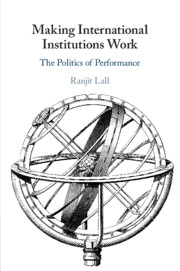Making International Institutions Work
International institutions are essential for tackling many of the most urgent challenges facing the world, from pandemics to humanitarian crises, yet we know little about when they succeed, when they fail, and why. This book proposes a new theory of institutional performance and tests it using a diverse array of sources, including the most comprehensive dataset on the topic. Challenging popular characterizations of international institutions as 'runaway bureaucracies,' Ranjit Lall argues that the most serious threat to performance comes from the pursuit of narrow political interests by states – paradoxically, the same actors who create and give purpose to institutions. The discreet operational processes through which international bureaucrats cultivate and sustain autonomy vis-à-vis governments, he contends, are critical to making institutions 'work.' The findings enhance our understanding of international cooperation, public goods, and organizational behavior while offering practical lessons to policymakers, NGOs, businesses, and citizens interested in improving institutional effectiveness.
- Develops an innovative new theory of the performance of international institutions
- Solves a real-world puzzle with significant practical implications
- Presents the most comprehensive and detailed data available on the performance of international institutions
Reviews & endorsements
‘A fascinating book that stands much of the conventional wisdom on what makes for effective international governance on its head. Ranjit Lall has written a deeply original and meticulously researched book that sets the standard for future work in this area.' Dani Rodrik, Harvard University
‘Ranjit Lall's original and persuasive argument is that institutional performance depends on linkages to transnational networks and deep engagement with civil society, which enhance policy autonomy and limit state interference. All serious students of international institutions should read this book.' Robert O. Keohane, Princeton University
‘… a welcome reminder that performance of IIs has varied greatly: many IIs have also succeeded in performing important tasks that make the world a better place.’ Felicity Vabulas, The Review of International Organizations
‘Scholars, students, and general readers alike will highly appreciate this theory-guided empirical research. Furthermore, the book lays the groundwork for new ways of thinking and understanding institutional performance.’ Yves Steinebach, Perspectives on Politics
‘… this impressive book embodies an important step towards greater appreciation of the promises and the limits of cooperating through international institutions.’ Herman T. Salton, International Affairs
Product details
February 2023Adobe eBook Reader
9781009216272
0 pages
This ISBN is for an eBook version which is distributed on our behalf by a third party.
Table of Contents
- 1. International institutions and the performance puzzle
- 2. A theory of institutional performance
- 3. Learning from assessment: quantitative tests on fifty-four institutions
- 4. Performing for scraps: comparing the FAO, the WFP, and IFAD
- 5. The performance of life: comparing the WHO, UNAIDS, Gavi, and GFATM
- 6. Effective but unaccountable?: autonomy and the politics of reform
- 7. The Politics of performance: contributions and implications: contributions and implications.







